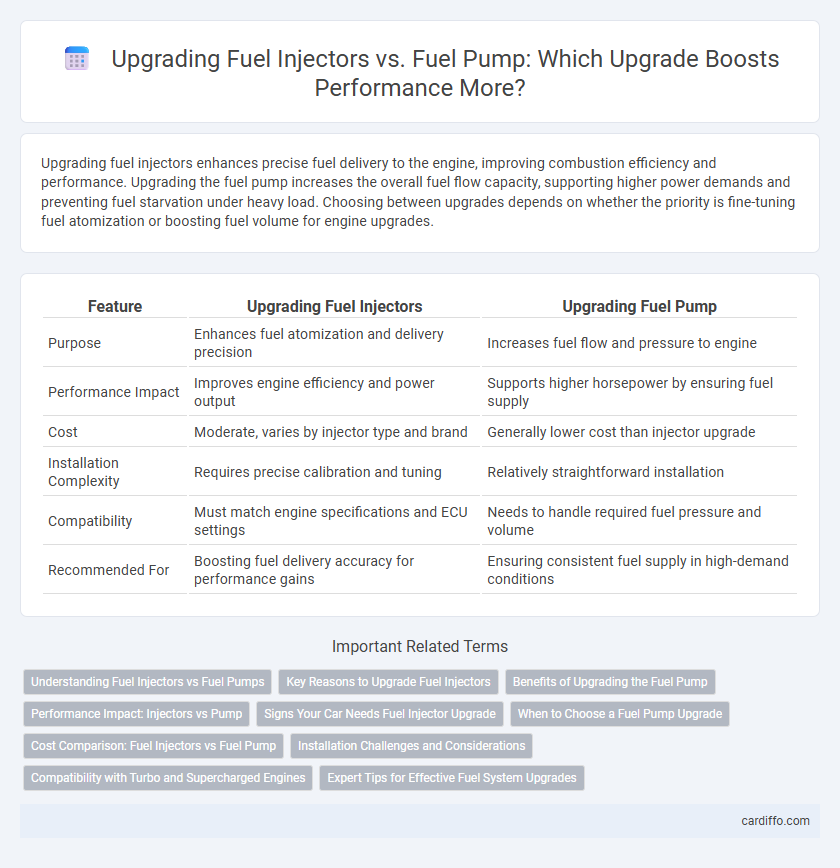Upgrading fuel injectors enhances precise fuel delivery to the engine, improving combustion efficiency and performance. Upgrading the fuel pump increases the overall fuel flow capacity, supporting higher power demands and preventing fuel starvation under heavy load. Choosing between upgrades depends on whether the priority is fine-tuning fuel atomization or boosting fuel volume for engine upgrades.
Table of Comparison
| Feature | Upgrading Fuel Injectors | Upgrading Fuel Pump |
|---|---|---|
| Purpose | Enhances fuel atomization and delivery precision | Increases fuel flow and pressure to engine |
| Performance Impact | Improves engine efficiency and power output | Supports higher horsepower by ensuring fuel supply |
| Cost | Moderate, varies by injector type and brand | Generally lower cost than injector upgrade |
| Installation Complexity | Requires precise calibration and tuning | Relatively straightforward installation |
| Compatibility | Must match engine specifications and ECU settings | Needs to handle required fuel pressure and volume |
| Recommended For | Boosting fuel delivery accuracy for performance gains | Ensuring consistent fuel supply in high-demand conditions |
Understanding Fuel Injectors vs Fuel Pumps
Fuel injectors precisely deliver fuel into the engine's combustion chamber, ensuring optimal air-fuel mixture for efficient combustion and performance. Fuel pumps maintain consistent fuel pressure and supply from the tank to the injectors, supporting uninterrupted engine operation. Upgrading fuel injectors enhances fuel atomization and combustion efficiency, while upgrading fuel pumps ensures stable fuel flow and pressure under increased demand.
Key Reasons to Upgrade Fuel Injectors
Upgrading fuel injectors enhances engine performance by improving fuel atomization and ensuring precise fuel delivery, leading to better combustion efficiency and increased horsepower. High-quality injectors can support higher fuel flow rates, accommodating modifications such as turbocharging or nitrous oxide systems without risking lean conditions. Fuel injectors also contribute to smoother throttle response and reduced emissions, making them a critical upgrade for both performance and environmental compliance.
Benefits of Upgrading the Fuel Pump
Upgrading the fuel pump improves fuel delivery consistency and supports higher engine performance by maintaining optimal fuel pressure under demanding conditions. Enhanced fuel pump capacity prevents lean conditions and engine hesitation during acceleration, especially in high-performance or modified engines. This upgrade ensures better fuel efficiency and reliability, reducing the risk of component wear and potential engine damage.
Performance Impact: Injectors vs Pump
Upgrading fuel injectors directly enhances the precision and volume of fuel delivery, resulting in improved throttle response and increased horsepower, especially at higher RPMs. In contrast, upgrading the fuel pump primarily ensures consistent fuel pressure and flow rate, supporting injector performance under demanding conditions but without significantly altering engine power on its own. Optimal performance gains are achieved when both injectors and pump are upgraded in tandem, enabling efficient fuel atomization and steady supply for maximum engine output.
Signs Your Car Needs Fuel Injector Upgrade
Signs your car needs a fuel injector upgrade include rough idling, poor acceleration, and decreased fuel efficiency. Frequent misfires, increased exhaust emissions, and engine hesitation during acceleration also indicate clogged or failing fuel injectors. Upgrading fuel injectors improves fuel atomization and engine performance, while a fuel pump upgrade primarily addresses fuel delivery pressure issues.
When to Choose a Fuel Pump Upgrade
Choose a fuel pump upgrade when experiencing low fuel pressure, inconsistent engine performance, or after installing high-performance fuel injectors that demand increased fuel delivery. Fuel pump upgrades are essential for vehicles running turbocharged or supercharged engines requiring higher fuel flow rates. Prioritizing fuel pump enhancements ensures optimal fuel supply, preventing engine lean conditions and maximizing power output.
Cost Comparison: Fuel Injectors vs Fuel Pump
Upgrading fuel injectors typically costs between $150 and $500 per injector, depending on type and brand, while upgrading a fuel pump generally ranges from $300 to $1,000 for parts and labor. Fuel injector upgrades may require replacing multiple units, increasing overall expense, whereas a single fuel pump replacement often incurs a higher upfront cost but fewer components. Choosing between upgrades depends on the vehicle's requirements and budget, with fuel injectors costing less individually but fuel pump upgrades providing broader system benefits at a higher price point.
Installation Challenges and Considerations
Upgrading fuel injectors often requires precise calibration and compatibility checks with the engine's control unit to avoid drivability issues, while installation can be complicated by the need to access hard-to-reach areas around the intake manifold. Conversely, upgrading the fuel pump involves evaluating fuel line capacity and pressure ratings to ensure the pump can adequately supply fuel without causing leaks or pressure drops, with installation challenges centered on safely disconnecting and reconnecting the fuel system components. Both upgrades demand careful consideration of the vehicle's fuel system specifications and may require professional tuning to optimize performance and prevent damage.
Compatibility with Turbo and Supercharged Engines
Upgrading fuel injectors offers precise fuel metering essential for turbocharged and supercharged engines, ensuring optimal air-fuel mixture under high boost pressure conditions. Fuel injectors designed for forced induction systems improve combustion efficiency and prevent running lean, protecting engine components from damage. While upgrading fuel pumps increases fuel flow capacity, matching injectors to turbo or supercharger demands is critical for maintaining compatibility and maximizing performance gains.
Expert Tips for Effective Fuel System Upgrades
Upgrading fuel injectors enhances fuel atomization and delivery precision, improving combustion efficiency and engine performance, while upgrading the fuel pump primarily increases fuel flow rate to meet higher demand. Experts recommend starting with fuel injectors for better throttle response and smoother power delivery, then upgrading the fuel pump to ensure sufficient fuel pressure for modified engines. Proper tuning and matching injector flow rates to pump capacity are critical for optimal fuel system performance and avoiding issues like lean conditions or fuel starvation.
Upgrading fuel injectors vs upgrading fuel pump Infographic

 cardiffo.com
cardiffo.com